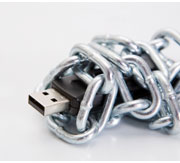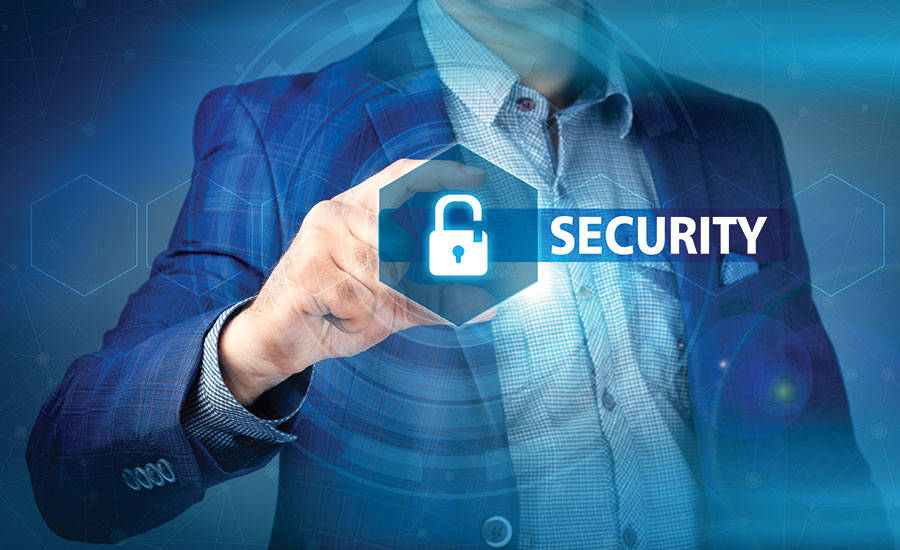
Everyone admits that a USB drive is the best choice for storing and transferring confidential data from one place to another. People use USB drives to store confidential information as well as for the purpose of storing personal stuff which may include music files, family photos, videos, letters and etc. Sometimes people need to transfer their data from one PC to another PC.
These small storage devices also come handy when you are travelling and are away from your home town.
For instance, businessmen often are required to travel to different cities and countries for the purpose of promoting their business, and need to carry business information with them. Since USB drives are small enough to carry easily while they have the capacity to store GBs of data, they have become the preferred choice for many businessmen.
Along with these benefits and advantages of USB drives, they are capable of causing a security risk incases of their loss or theft. They may result in privacy breach and data lost, particularly if they contain sensitive information like your financial records, business plans and bank statements.
Because of the extensive use of USB drives all around the globe, the security of data they contain becomes a critical issue for almost every entrepreneur. The basic reason behind this is the fact that USB drives are small enough to get stolen or lost easily. You may forget them wherever you take them like at airport, office working table, internet cafe or at your friend’s home; and in that case your privacy definitely is at risk!
A recent study shows that the cost of privacy breaches and data loss due to lost, misplacement or theft has reached up to three million dollars. All these facts highlight the significance of using a protected portable storage device.
Now, when it comes to protecting your data, the most common thing that comes to our mind is password protection. Same approach goes with the USB Security. If you do not want to complicate yourself with knotty technical procedures, you can choose to simply password protect USB drive and all its data.
Benefits Of Blocking USB Ports

The benefit of blocking USB ports is that it can help protect a computer from malicious software, viruses, and other forms of cyber attack. Blocking USB ports can also help prevent unauthorized access to data and sensitive information. Additionally, blocking USB ports can help protect against data theft and unauthorized use of computer resources.
Are USB Data Blockers Necessary?
No, USB data blockers are not necessary. USB data blockers are used to protect a device from unauthorized access to the data stored on it. They are not necessary unless you are particularly concerned about someone gaining access to your data without your permission.
Can A USB Cable Steal Data?
Yes, a USB cable can potentially steal data if it is used to connect to a device that is not properly secured. USB cables can be used to transfer data between two devices, which can include malicious code or malware. To prevent data theft, it is important to ensure that all USB devices are properly secured and that all data is encrypted. It is also important to ensure that all USB cables are from reputable sources.
Can A Virus Disable USB Ports?
Yes, a virus can potentially disable USB ports. Viruses can infect the system and cause the USB ports to become unresponsive or malfunction.
Protect My USB Ports On My Phone
To protect your USB ports on your phone, you should always make sure that your device is up to date and use a reputable antivirus software. Additionally, you should always use a USB cable from a reputable source and avoid plugging in unknown USB devices. You should also be careful when transferring data between devices and make sure that the data is encrypted.
Security Risks Are Associated With USB Drives
USB drives can pose a number of security risks, including the potential for malware or malicious code to be installed on the device without the user’s knowledge. Additionally, if the USB drive is not encrypted, the data stored on it can be accessed by anyone with physical access to the device. Furthermore, USB drives can be used to copy large amounts of data quickly, which can be used for malicious purposes. Finally, USB drives can be used to spread malware and viruses, which can cause serious damage to an organization’s network.
What Happens If You Lose Your USB Security Key?
If you lose your USB security key, you may be at risk of unauthorized access to your data. This is because the key is used to encrypt the data stored on the USB drive, and without it, the data can be accessed by anyone with physical access to the device. Additionally, if the USB drive is not encrypted, the data stored on it can be accessed by anyone with physical access to the device. Therefore, it is important to always keep your USB security key in a secure place.
Can Hackers Access USB?
Yes, hackers can access USB drives. However, the risk of this happening is significantly reduced if the USB drive is encrypted. Encryption prevents unauthorized users from accessing the data stored on the drive, even if the USB drive is physically accessed by a hacker.
Can A USB Destroy A Computer?
No, a USB drive cannot destroy a computer. However, if the USB drive contains malicious software, it can cause damage to the computer, such as corrupting files or causing the computer to crash. Additionally, if the USB drive is connected to a computer that is already infected with malware, the malware can spread to the USB drive and other connected devices.
Can Malware Hide In USB?
Yes, malware can hide in a USB drive. Malware can be stored in a hidden file or folder on the USB drive, or it can be disguised as a legitimate file or program. Once the USB drive is connected to a computer, the malware can be installed and run, allowing it to access and damage the computer.
Signs USB Has Malware?
You can scan your USB drive with an antivirus program to check for malware. If the drive is infected, the program will detect and remove the malicious files. It is also important to be aware of any suspicious activity on your computer, such as unexpected pop-ups or programs running in the background, as these could be signs of a malware infection.
Can A Hacker Hack A USB?
Yes, a hacker can hack a USB drive. Hackers can use malicious software to access the data stored on the drive, or to install malware on the drive.
Devices That Cannot Be Hacked
No device is completely secure and can be completely unhackable. However, some devices are more secure than others, such as those with strong encryption, two-factor authentication, and other security measures in place.
Encrypted USB Can Be Hacked
Yes, encrypted USB drives can still be hacked. Although the encryption provides some level of protection, it is not foolproof and can be bypassed by a skilled hacker. It is important to use strong passwords and other security measures to protect the data stored on the USB drive.
Should I Encrypt My USB
Yes, it is always a good idea to encrypt your USB drive. Encryption will help protect your data from unauthorized access and will help prevent data loss if the USB is lost or stolen. Additionally, encryption can help prevent malware from being installed on the USB drive.
How Secure Is A USB Security Key?
A USB security key is a physical device that is used to provide an extra layer of security when logging into a computer or other device. The USB security key stores a cryptographic key that is used to authenticate the user and provide access to the device. The security of the USB security key depends on the type of encryption that is used, as well as the strength of the password used to protect the key. Generally speaking, USB security keys are considered to be very secure and are an effective way to protect sensitive data.
Prevent Data From USB Theft
To prevent data from USB theft, it is important to ensure that the USB drive is password protected and encrypted. Additionally, it is important to use a USB security key to authenticate the user and provide access to the device. It is also important to be aware of the physical security of the USB drive, such as keeping it out of sight and in a secure location. Finally, it is important to back up any important data on a regular basis, as it is possible for data to be stolen even with strong security measures in place.
Use USB As A Security Key
In order to use your USB drive as a security key, you will need to set up a password-protected encryption system. You can do this by using a program such as TrueCrypt or BitLocker. Once you have set up the encryption system, you will need to create a password or passphrase that will be used to access the encrypted data on the USB drive. You can then use the same password or passphrase to access the USB drive each time you need to access the data.
USB Secure , one of the most powerful USB locking software programs, creates a secure boundary around the data that you want to protect in your USB flash drive. So that whenever someone tries to gain access to your USB drive’s data, it prompts for a correct password; the failure in the entry of which puts barricades between your data and the unauthorized intruder.
You can carry USB Secure on the same USB drive and run it without the need to install it on a host computer; and USB Secure can be used on any USB drive that turn a cheap and commonly available USB drive into a Secure USB drive.
